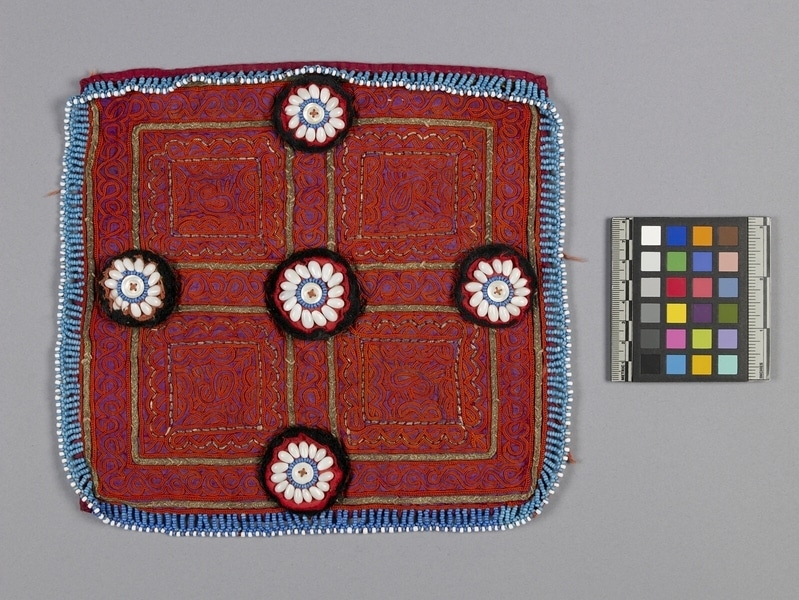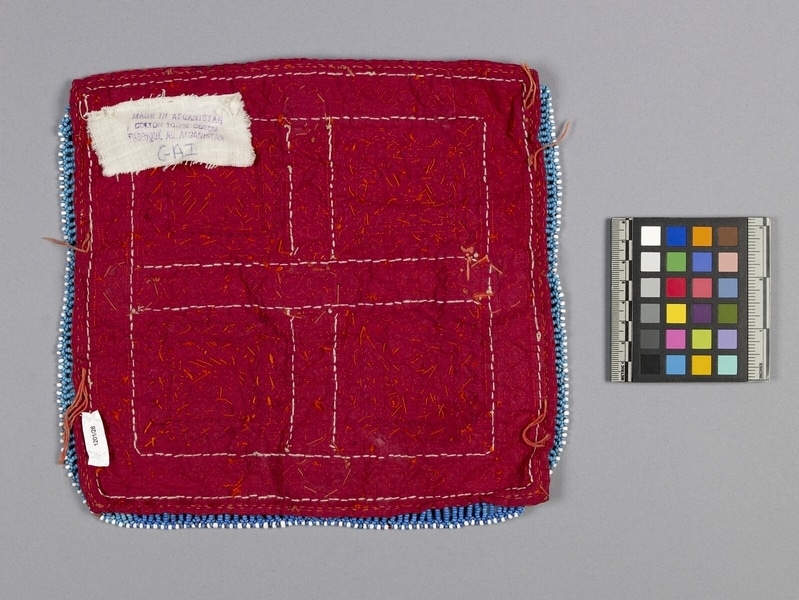Dress Panel Textile Item Number: 1201/28 from the MOA: University of British Columbia


Description
Densely embroidered square textile, stitched overall with meandering patterns worked in orange thread in chain stitch on a background of purple silk or cotton textile. The design field is divided into four equally sized squares, separated from one another with rows of narrow gold metallic braid. The textile is embellished with five large (4 cm) ornamental discs, made from several layers of black cotton textile, topped with a layer of red cotton textile and embellished with white cowrie shells, blue glass beads and white shell buttons; one of these discs is located at the centre of each of the four sides of the textile, and there is one in the centre. The textile is edged with blue and white glass beading on all four sides. The embroidery is backed with a layer of dark red cotton textile.
History Of Use
Intended to be sewn onto the center front of a dress bodice.
Iconographic Meaning
The ornamental discs, called ‘dress flowers’ (gul-i-peron), are emblems of good fortune. Their use is wide-spread in the area and have been found in burials sites dating before 400 B.C.
Narrative
Purchased from Alan Davidson when his Calgary import store, Terlingua, was liquidating its stock prior to closing. The provenance of this textile is unknown. Made in either Pakistan or Afghanistan. It is identified as Pashtun based on the style of the embroidery, as illustrated in published sources. The ornamental discs, called ‘dress flowers’ (gul-i-peron), are emblems of good fortune. Their use is wide-spread in the area and have been found in burial sites dating to 400 B.C.E.
Item History
- Made in Afghanistan ? or Pakistan ?
- Collected in Ghazni, Afghanistan
- Owned by Alan Davidson before February 24, 1987
- Received from Alan Davidson (Seller), Ruth Read Bequest (Funding source) and Museum of Anthropology Shop Volunteers (Funding source) on February 24, 1987
What
- Name
- Dress Panel Textile
- Identification Number
- 1201/28
- Type of Item
- textile
- Material
- cotton fibre, glass, shell, dye, metal, silk fibre and cowrie shell
- Manufacturing Technique
- embroidered
- Overall
- height 25.5 cm, width 24.7 cm
Who
- Culture
- Pashtun
- Previous Owner
- Alan Davidson
- Received from
- Alan Davidson (Seller), Ruth Read Bequest (Funding source) and Museum of Anthropology Shop Volunteers (Funding source)
Where
- Holding Institution
- MOA: University of British Columbia
- Made in
- Afghanistan ? or Pakistan ?
- Collected in
- Ghazni, Afghanistan
When
- Ownership Date
- before February 24, 1987
- Acquisition Date
- on February 24, 1987
Other
- Item Classes
- textiles; beadwork
- Condition
- good
- Accession Number
- 1201/0028